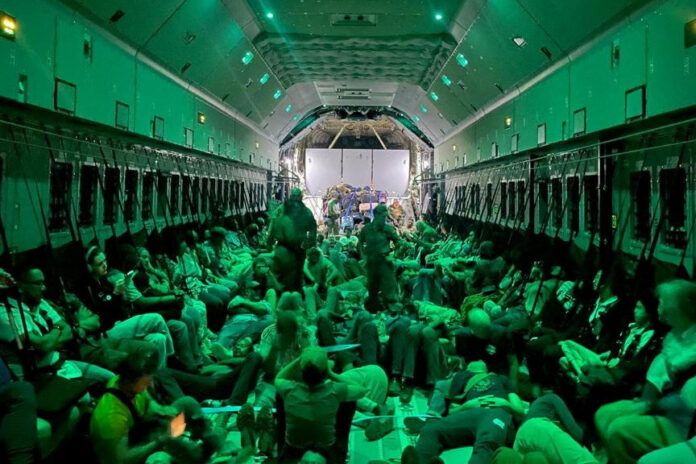(Khartoum) Many countries continued Monday to evacuate their nationals en masse from Sudan, on the edge of the “precipice”, warned the UN secretary general, after 10 days of fighting between the army and paramilitary forces which have already claimed more than 420 lives.
Explosions, air raids and shootings have not stopped since April 15 in Khartoum, the capital of five million inhabitants plunged into chaos, deprived of water and electricity, where food shortages are taking hold.
On Monday, the doctors’ union issued an urgent appeal on Facebook: “Several districts of Khartoum are bombarded, there are dead civilians and around 50 seriously injured, all nearby doctors must go there as soon as possible”.
The violence risks “invading the whole region and beyond”, warned UN Secretary General Antonio Guterres, calling once again for a ceasefire to “steer Sudan away from the precipice”. .
Despite the departure of many ambassadors, diplomats and foreign nationals, Volker Perthes, the head of the UN mission which has been trying for four years to obtain from the military in power a transition to civilian democracy, will remain. “The UN is not planning to leave Sudan,” he said.
Foreign capitals have managed to negotiate passages with the two belligerents: the army of General Abdel Fattah al-Burhane, de facto ruler of Sudan, and his deputy turned rival, General Mohamed Hamdane Daglo, who commands the paramilitaries of the Forces de rapid support (FSR).
It was necessary “to take advantage of a small window of opportunity”, explains a spokesperson for the British government. “With intense fighting in Khartoum and the closure of the main airport, the scene of fighting from the start of the conflict, “a wider temporary evacuation was impossible”.
More than 1000 EU nationals have nevertheless been evacuated, “a first group” of Chinese, several dozen South Africans and hundreds of nationals of Arab countries have also left, by road, sea or air.
A Lebanese national, ready to embark for Saudi Arabia in Port Sudan, a coastal city in eastern Sudan spared from the violence, told AFP that he left with “a t-shirt and pajamas”, while what remains to him “after 17 years” in Sudan.
In Khartoum, where the telephone network is very degraded, “we were under siege, like in a thriller”, he confides. “War fell upon us without warning”, and now “everything is destroyed”.
About 700 international staff from the UN, international NGOs and embassies “have been evacuated to Port Sudan”, the UN said.
Forty-three international staff and 29 members of international NGOs “have been evacuated” to Chad from El-Geneina and Zalingei, two capitals of western Darfur, the region most affected by fighting with Khartoum, according to the UN mission.
Most of the evacuated foreigners are diplomatic staff. Many nationals are still waiting for a place in the long convoys of white cars or buses that leave continuously from Khartoum.
Upon arrival in Djibouti, where many foreign troops are stationed, haggard families disembark in the midst of soldiers who organize the incessant ballet of evacuations.
Experts and humanitarians are now worried about the fate of the Sudanese.
“I fear for their future,” Norwegian Ambassador Endre Stiansen admitted on Twitter.
Both sides accuse each other of attacking prisons to get hundreds of prisoners out and of looting homes and factories. Clashes erupted near several banks.
In a country where inflation is already in three figures in normal times, the kilo of rice or the liter of gasoline are now exchanged at gold prices.
However, fuel is the key to escape to Egypt, 1000 kilometers to the north, or to reach Port Sudan and hope to get on a boat.
“As foreigners who can flee, the impact of the violence on an already critical humanitarian situation is worsening,” warns the UN, whose agencies, like many humanitarian organizations, have suspended their activities.
Five aid workers have been killed and, according to the doctors’ union, nearly three-quarters of hospitals are out of service.
Sudanese have already fled to Egypt and South Sudan, which has 800,000 refugees in Sudan. Among them, women and children are now crossing in the other direction, according to the UN.
At least 20,000 Sudanese have taken refuge in Chad, which borders Darfur.
This region, the poorest in the country, was ravaged in the 2000s by a war ordered by the dictator Omar al-Bashir, ousted in 2019, and led in particular by the Janjawid militiamen, the bulk of General Daglo’s troops.
Today inaccessible, it is once again prey to looting, attacks and abuses in a country where more than one in three inhabitants suffered from hunger before the conflict.
This had been brewing for weeks between the two rival generals, allies for the 2021 putsch but who failed to agree on the integration of the FSR into the regular troops.


















